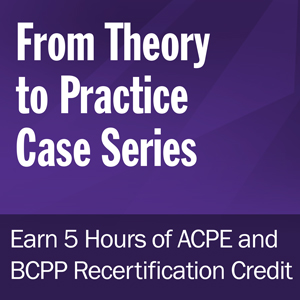Course Description

Activity Dates: 09/29/2025 - 03/27/2026
- A complex patient case consisting of 3 encounters over a period of time.
- Three instructional, pre-recorded webinars accompanying each encounter.
- Five (5) hours of ACPE credit and 5 hours of BCPP Recertification credit, achieved by successfully completing the online AAPP recertification examination. BCPP Recertification credit is earned and reported within the year the assessment is successfully completed (2025 or 2026).
- Access to the AAPP testing center with exam submission due by March 27, 2026. Exam extensions will not be granted after exam deadlines. In cases of personal or family illness that prevents completion of an exam, AAPP will transfer your product purchase to a comparable BCPP Recertification course after a letter documenting the unique circumstances is received by the AAPP office.
IMPORTANT NOTE: Since this product involves progression through a patient case over a period of time, it is highly recommended by the Editorial Board and past users, that you carve out 5 hours for the course and complete all in 1 sitting.
Consider making this product part of your BPS Continuing Professional Development plan! Please refer to the BPS Psychiatric Pharmacy Content Outline to see how this activity may align.
Credit is awarded in the calendar year the assessment is completed. AAPP reports continuing credit for ACPE (CPE Monitor) and BCPP Recertification (BPS) within days of successful exam completion.
Learning Objectives
- Identify treatment issues applicable to patients with bipolar disorder prior to, during, and after pregnancy.
- Implement evidence-based pharmacologic and/or nonpharmacologic strategies for patients diagnosed with bipolar disorder prior to, during, and after pregnancy.
- Provide monitoring recommendations for pregnant and lactating patients treated with medications for bipolar disorder.
Target Audience
BCPPs desiring a case-based learning activity at the specialist level focused on a complex patient case intertwined with comorbid medical diagnoses and contemporary issues in psychiatric pharmacy are the intended audience of this recertification activity. BCPPs who are auditory and visual learners and/or who learn best from practical application to a patient case mirroring real-life scenarios will find value in this course. BCPPs responsible for teaching/precepting others also note the value of this product long after completing it for their personal learning.
Faculty

View biographical information
Kristen Gardner, PharmD, BCPP
Clinical Pharmacy Specialist – Behavioral Health, Kaiser Permanente – Colorado
Course Requirements
To satisfactorily complete the recertification programming and receive BCPP Recertification and ACPE credit, candidates must meet the following requirements:
- Register for this course.
- Review the full content of the activity and reflect upon its teachings.
- Abide by a confidentiality and honesty statement requiring individual completion of the course.
- Complete the post-test at the end of the activity no later than the closing activity date.
- Complete an activity evaluation form.
- Wait for an official review of exam questions within 4 weeks following the closing date.
- Receive a passing grade (72%).
- Partial credit is not provided; your exam score must meet or exceed the cut-off score in order to receive the ACPE and BCP Recertification credit.
- Learners who do not achieve a passing score on a post-activity assessment may appeal assessment questions and/or take a remediation assessment. View AAPP's Post-Activity Assessment Appeal and Remediation Policy.
- Provide the necessary details in your profile to ensure correct reporting by AAPP to CPE Monitor.
Continuing Education Credit and Disclosures
Activity Dates: 09/29/2025 - 03/27/2026
ACPE Contact Hours: 5
ACPE Number: 0284-0000-25-033-H01-P (Application)
Nursing Credit Reminder: Note that ACPE credit is accepted for ANCC Certification Renewal and AANPCB advanced practice provider content. For specific questions related to your organization's acceptance of ACPE continuing education units, please contact your organization directly.
![]() The American Association of Psychiatric Pharmacists is accredited by the Accreditation Council for Pharmacy Education as a provider of continuing pharmacy education. The From Theory to Practice Case Series product is an application-based program approved for 5 ACPE hours. To receive ACPE credit, pharmacists completing this programming are required to complete an evaluation of the course as well as pass an online examination.
The American Association of Psychiatric Pharmacists is accredited by the Accreditation Council for Pharmacy Education as a provider of continuing pharmacy education. The From Theory to Practice Case Series product is an application-based program approved for 5 ACPE hours. To receive ACPE credit, pharmacists completing this programming are required to complete an evaluation of the course as well as pass an online examination.
AAPP owns the copyright, is licensed or has received permissions for use of, or is otherwise permitted to use copyrighted materials within any CPE activity. Authors and speakers are required to obtain necessary copyright permissions for content in CPE activities. AAPP complies with copyright laws and regulations.
View planning committee disclosures
2025 From Theory to Practice Case Series Editorial Board
| Beth DeJongh, PharmD, BCPS, BCPP Director of Continuing Professional Development American Association of Psychiatric Pharmacists Lincoln, NE No Relevant Financial Relationships to Disclose |
| Megan Ehret, PharmD, MS, BCPP Professor University of Maryland Monrovia, MD External Consultant Activities, Advisory Panels, Speakers Bureaus, etc.: Saladex Biomedical Consultant, Lexi-Comp Consultant/Reviewer, SMI Adviser; Pharmacist Consultant Educational Grants, Research Grants or Contracts: FDA/University of Maryland CERSI, Maryland Behavioral Health Department, NIH |
| Amre Elmaoued, PharmD, PhC, BCPP Albuquerque, New Mexico No Relevant Financial Relationships to Disclose |
| Rebecca Graham, PharmD, BCPP VISN 10 Pharmacogenomics Program Manager VISN 10 Clinical Resource Hub Orlando, FL No Relevant Financial Relationships to Disclose |
| Monica Mathys, PharmD, BCGP, BCGP, BCPP Professor Texas Tech Health Science Center - School of Pharmacy Dallas, TX Non-Financial Interests: AAPP Foundation Board member |
| Karen Moeller, PharmD, BCPP Clinical Professor University of Kansas Kansas City, KS No Relevant Financial Relationships to Disclose |
All relevant relationships have been mitigated.
View disclaimer and disclosure of off-label use
Off-Label Use: This educational activity may contain discussion of published and/or investigational uses of agents that are not indicated by the FDA (see faculty information). The opinions expressed in the educational activity do not necessarily represent the views of AAPP and any educational partners. Please refer to the official prescribing information for each product for discussion of approved indications, contraindications, and warnings.
Disclaimer: Participants have an implied responsibility to use the newly acquired information to enhance patient outcomes and their own professional development. Any procedures, medications, or other courses of diagnosis or treatment discussed or suggested in this activity should not be used by clinicians without evaluation of their patient’s conditions and possible contraindications on dangers in use, review of any applicable manufacturer’s product information, and comparison with recommendations of other authorities. Please refer to the official prescribing information for each product for discussion of approved indications, contraindications, and warnings.
View fair balance and integrity statement
It is the policy of AAPP to ensure independence, balance, objectivity, scientific rigor, and integrity in continuing education activities. Those involved in the development of this continuing education activity have made all reasonable efforts to ensure that information contained herein is accurate in accordance with the latest available scientific knowledge at the time of accreditation of this continuing education activity. Information regarding drugs (e.g., their administration, dosages, contraindications, adverse reactions, interactions, special warnings, and precautions) and drug delivery systems is subject to change, however, and the reader is advised to check the manufacturer’s package insert for information concerning recommended dosage and potential problems or cautions prior to dispensing or administering the drug or using the drug delivery systems.
Fair balance is achieved through ongoing and thorough review of all materials produced by faculty, and all educational and advertising materials produced by supporting organizations, prior to educational offerings. Approval of credit for this continuing education activity does not imply endorsement by AAPP for any product or manufacturer identified.
